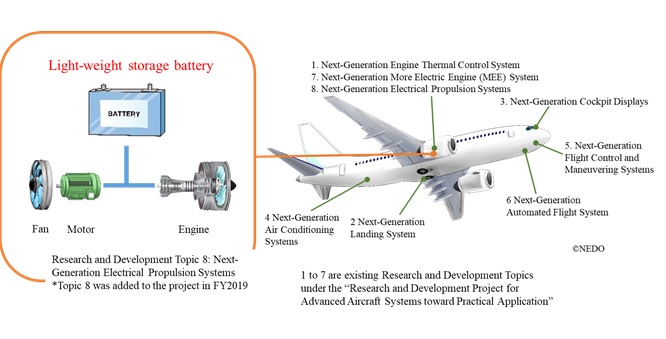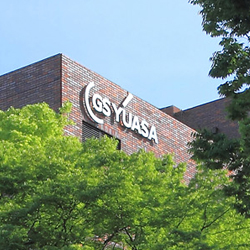GS Yuasa Corporation (Tokyo Stock Exchange: 6674; “GS Yuasa”) today announced that subsidiary GS Yuasa International Ltd. (“GS Yuasa International”) has been selected by the New Energy and Industrial Technology Development Organization (NEDO) to carry out outsourced R&D work on lightweight storage batteries for aircraft. The R&D work is part of the “Next-Generation Electrical Propulsion Systems” component of NEDO’s “Research and Development Project for Advanced Aircraft Systems toward Practical Application”.*
The aim of the project is to meet societal needs by developing highly safe, lightweight, and low-cost advanced aircraft systems and hone and refine them to a level where they can be utilized in next-generation aircraft. Under the project, consideration is being given to the use of motors powered by storage batteries for electrical propulsion.
To be suitable for installation in next-generation aircraft, storage batteries will require high levels of energy density. GS Yuasa International’s R&D work will pursue further development of fundamental technologies (electrodes, electrolyte, etc.), battery control systems, and module/pack structures with focus on achieving energy density levels of 1,000 Wh/kg (per cell) by 2030. The aim is to successfully produce the kind of lightweight batteries that next-generation aircraft will require.
GS Yuasa International will sub-contract the development of fundamental technologies to Kansai University. Sulfur is considered to have strong potential as cathode material on high-energy-density storage batteries, and Kansai University’s Professor Masashi Ishikawa is vigorously pursuing R&D work on sulfur cathode material as a leading authority in the field. Collaboration with an outstanding research institution like Kansai University will be indispensable for achieving the aims of this R&D work and GS Yuasa International will be working in close coordination with the university to tackle the challenges on the way to achieving those aims.
GS Yuasa will contribute to the realization of next-generation aircraft through its participation in the “Research and Development Project for Advanced Aircraft Systems toward Practical Application”.
*NEDO’s “Research and Development Project for Advanced Aircraft Systems toward Practical Application” covers eight “Research and Development Topics”. The ultimate goal of the project is to create prototype models of advanced aircraft systems and demonstrate, either on the ground or in the air, that these systems provide levels of performance and functionality that are superior to those of existing systems.
■Overview of the “Research and Development Project for Advanced Aircraft Systems toward Practical Application”






